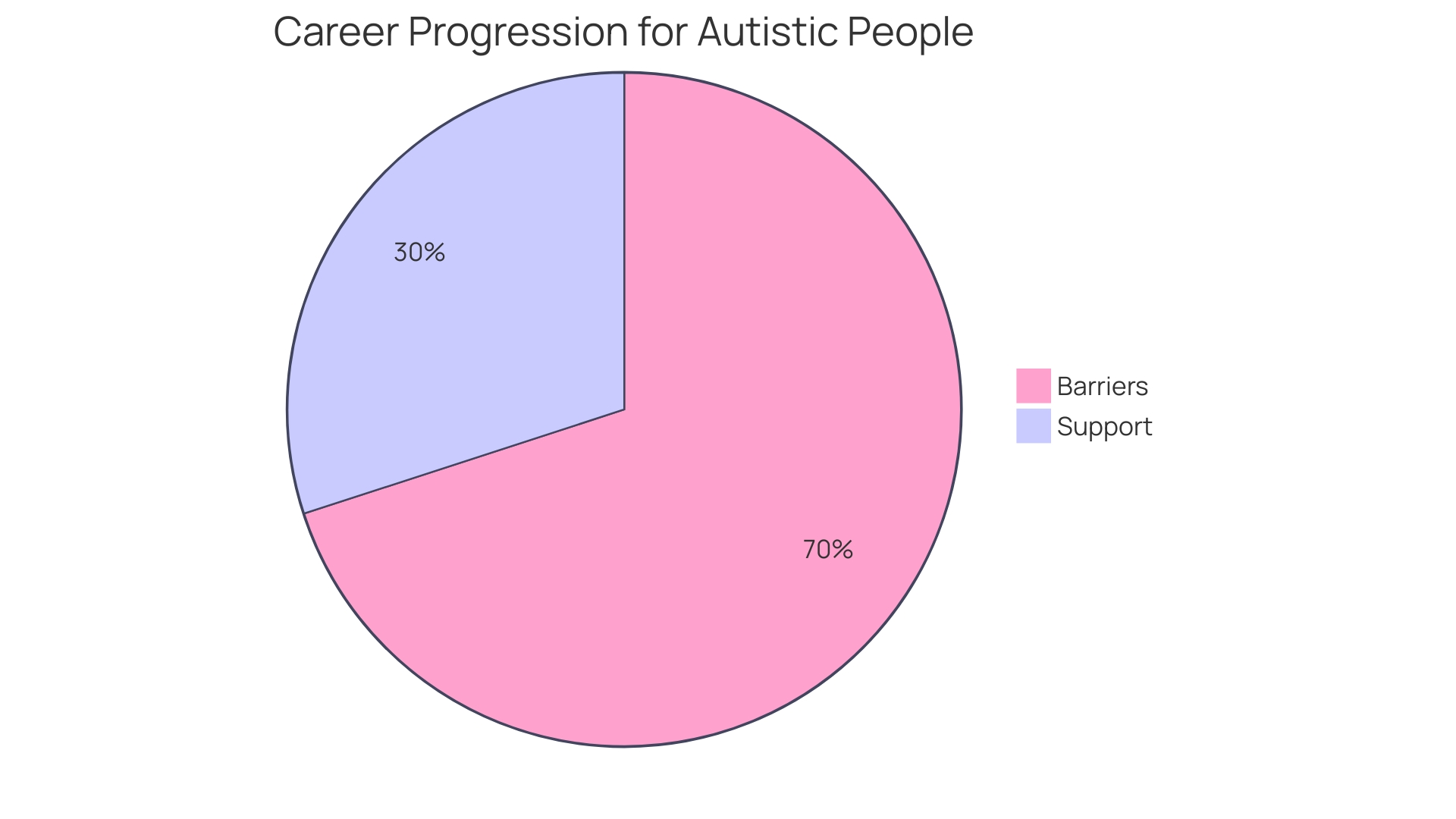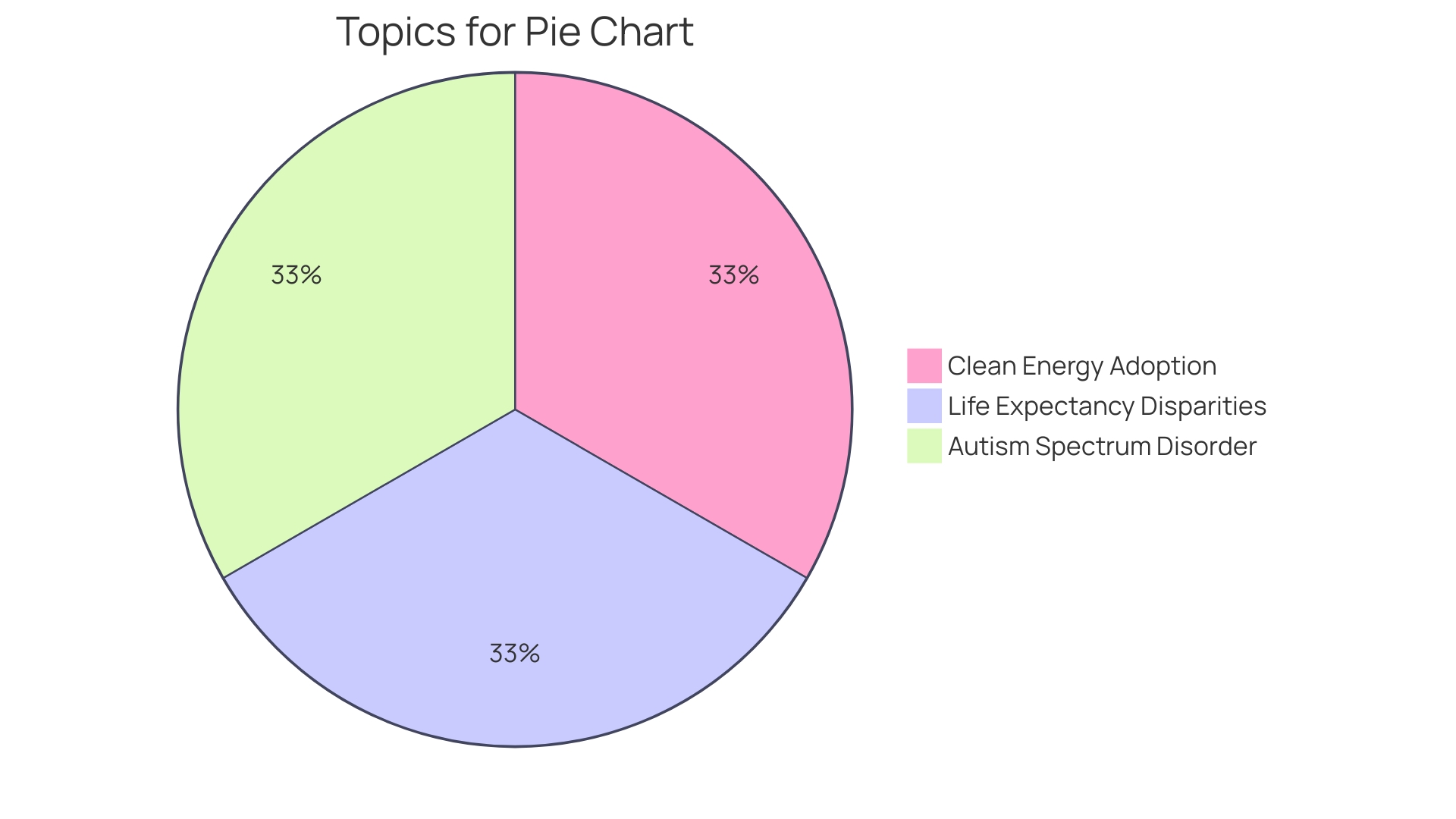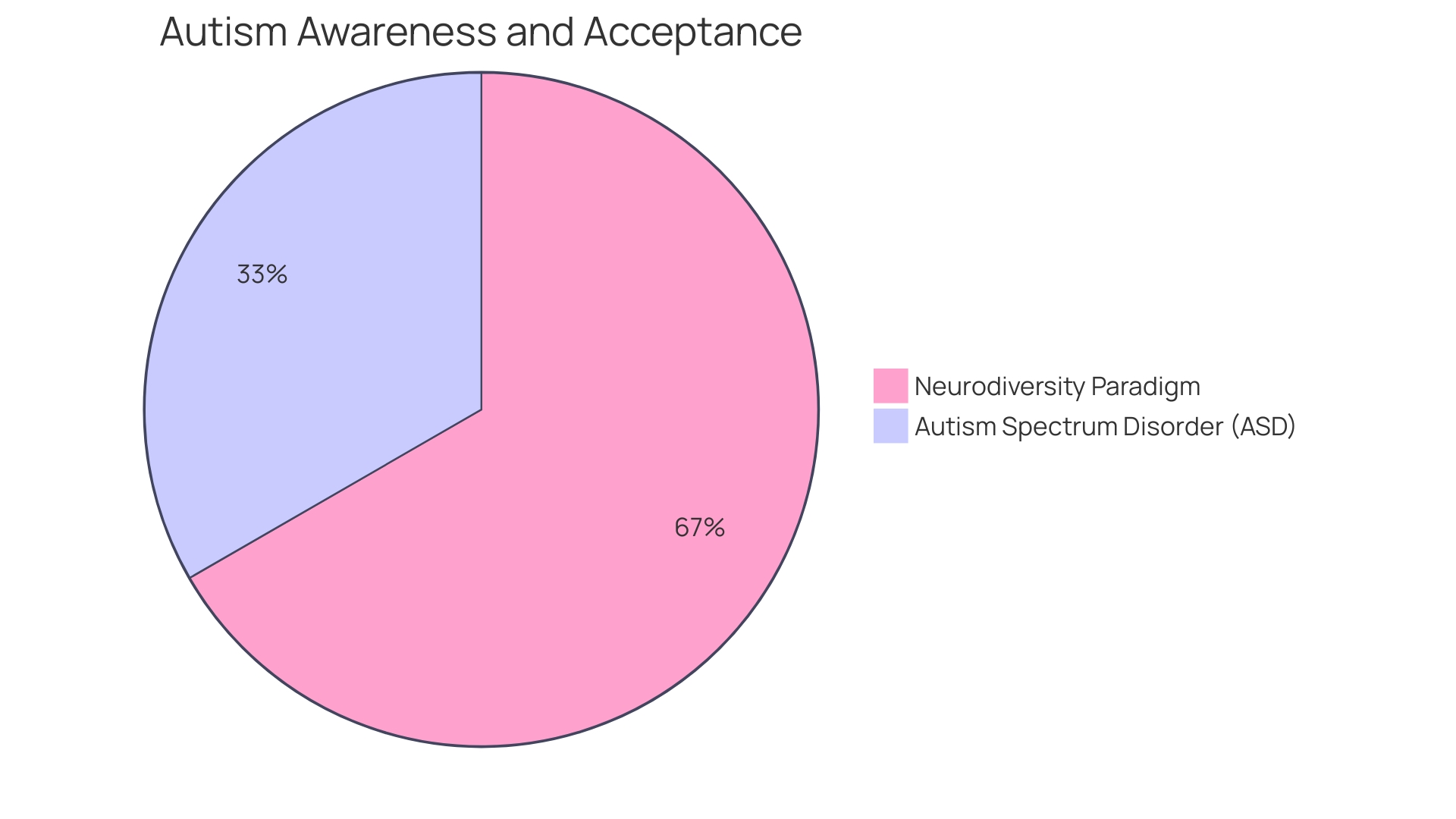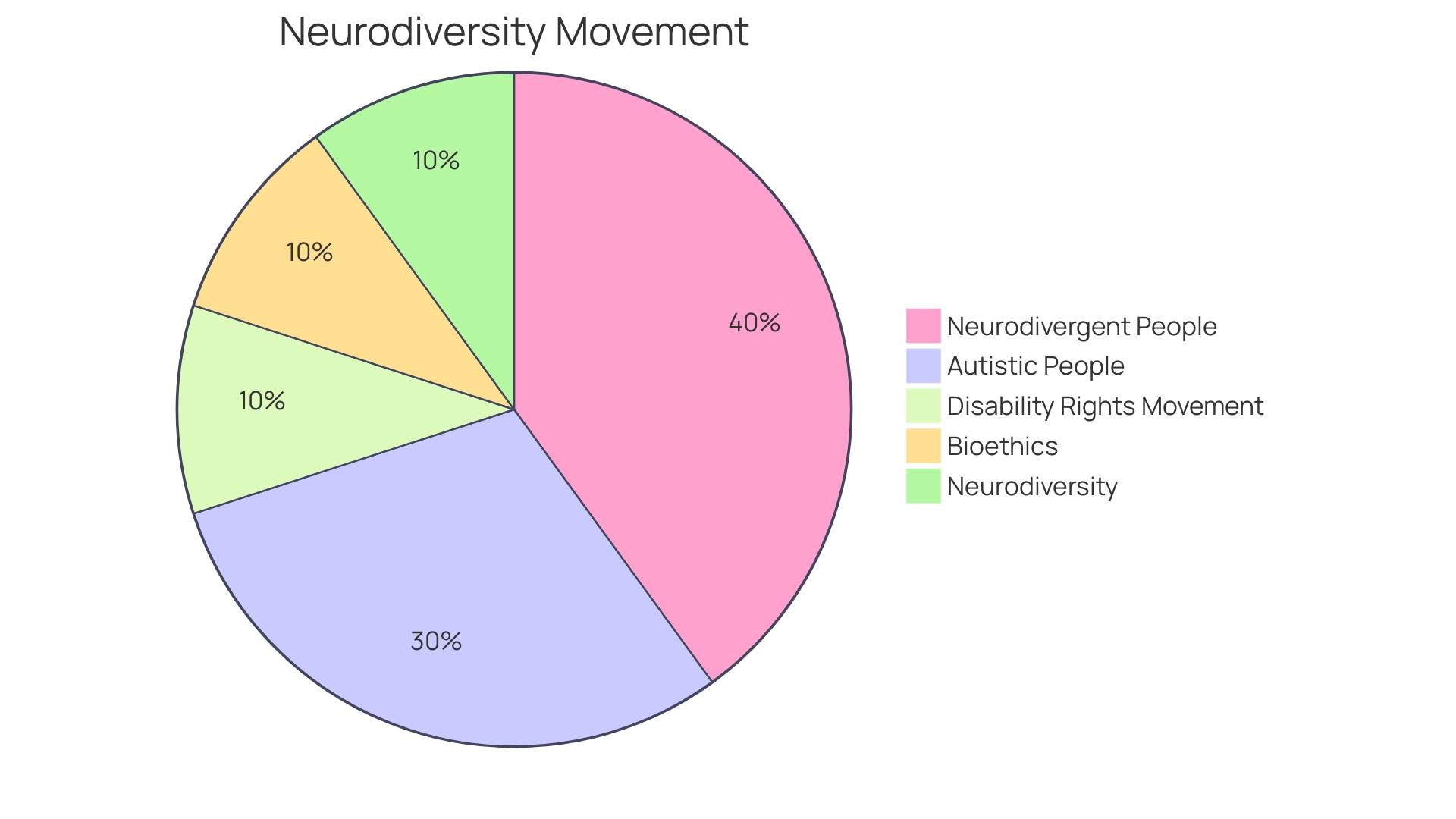Introduction
April is an important month for reflection, action, and advocacy as we observe Autism Awareness Month, also known as Autism Acceptance Month. Since its inception in the 1970s, this global movement has shed light on the experiences of individuals with autism and aims to not only raise awareness but also promote their strengths and capabilities. The focus this year is on supporting autistic adults who face significant unemployment or underemployment, despite being dedicated employees with unique talents and perspectives.
By providing reasonable accommodations and embracing neurodiversity, we can unlock the invaluable contributions of autistic individuals in the workplace. Autism spectrum disorder (ASD) affects behavior, social skills, and communication, and it is crucial for everyone, from friends and family to co-workers and educators, to understand and support individuals with ASD. April serves as a pivotal month to enhance understanding and acceptance of neurodiversity, appreciating the unique experiences of each individual and embracing the strengths and talents they bring to our communities.
Let's commit to fostering an environment of inclusion and appreciation for the rich tapestry of the neurodivergent community, not just this month but year-round, as we continue to learn and grow in our understanding of autism.
History of Autism Awareness Month
The observance of Autism Awareness Month, also known as Autism Acceptance Month, is a significant time for reflection, action, and advocacy. Since its inception in the 1970s by the Autism Society of America, it has grown into a worldwide movement spotlighting the experiences of individuals with autism. This April, the focus is on not only raising awareness but also promoting the strengths and capabilities of those on the autism spectrum.
Recent statistics paint a concerning picture, with up to 90% of autistic adults in the United States facing unemployment or underemployment. Despite this, many companies' diversity and inclusion policies overlook the specific needs of disabled individuals. Yet, autistic adults are often incredibly dedicated employees, with a propensity for longevity in positions and fewer days off compared to their neurotypical peers. Furthermore, providing reasonable accommodations for autistic employees often comes at no cost, emphasizing that their contributions to the workplace are invaluable. The National Geospatial-Intelligence Agency's pilot program to hire autistic individuals is a testament to the private sector recognizing the potential that neurodiversity brings to the workforce.
Autism spectrum disorder (ASD) encompasses a diverse range of conditions that affect behavior, social skills, and communication, and its impact is lifelong. Understanding and supporting individuals with ASD is vital, not just for friends and family but for everyone they interact with, including co-workers and educators.
April serves as a pivotal month to enhance understanding and acceptance of neurodiversity. Autism is a complex developmental condition with a broad spectrum of traits. It's imperative to appreciate the unique experiences of each individual and to embrace the strengths and talents they bring to our communities. By advancing the neurodiversity paradigm, we acknowledge that neurological differences are a valuable aspect of human diversity.
The term 'autism' derives from the Greek word 'autos,' meaning 'self,' first used by Swiss psychiatrist Eugen Bleuler in 1911. Initially confused with childhood schizophrenia, the work of psychiatrists Leo Kanner and Hans Asperger in the 1940s began to distinguish autism as a unique syndrome. Today, we understand autism as a natural variation in human brain function, integral to the diversity of our society.
As we continue to observe World Autism Month, let's commit to fostering an environment of inclusion and appreciation for the rich tapestry of the neurodivergent community, not just this month but year-round. The journey of understanding autism is ongoing, and each step forward enriches our collective knowledge and empathy.

Evolution to Autism Acceptance Month
The evolution from Autism Awareness to Autism Acceptance Month is a reflection of a deeper comprehension of autism, underpinning a commitment to foster acceptance and create a more inclusive environment for individuals with autism. The goal is to appreciate the distinctive contributions and capabilities of those on the autism spectrum, dismantling misconceptions and advocating for an inclusive community.
Autism Acceptance Month emerged from the neurodiversity movement, which celebrates neurological differences like autism as a valuable aspect of human diversity. This paradigm challenges the notion of a typical or 'normal' brain, acknowledging that each individual, including those who are autistic, offers unique skills and viewpoints that enhance society.
This perspective is echoed in the experiences of parents who understand that recognizing the genuine sensory needs of autistic individuals can lead to greater empathy and accommodation, both in personal interactions and within the workplace. A parent reflects on their own growth, noting how learning about their child's autistic experience has fostered a more understanding and patient environment, emphasizing the importance of considering neurodivergent needs.
Associate Professor Hala Annabi underscores the importance of not only hiring neurodivergent individuals but also supporting their career progression. Organizations are encouraged to look beyond entry-level positions and help autistic employees visualize and advocate for their career pathways.
Autism is a developmental condition that influences how people perceive and interact with the world around them. It is vital to acknowledge that autism is a natural variation of the human brain, not a condition that requires a cure. Autistic individuals have always been a part of society, bringing forth their inherent strengths and talents.
Recent news highlights the wide spectrum of autism and its lifelong implications on behavior, social skills, and communication. People who are familiar with autism understand its impacts and how to support those affected. However, this knowledge is not universally shared, necessitating broader education and awareness to ensure that autistic individuals receive the support they need in all facets of life.
In the workplace, for instance, accommodating the sensory needs of autistic employees can lead to more productive and comfortable environments. Such understanding and accommodations can be crucial for those in the neurodivergent community seeking fulfilling careers.
Ultimately, Autism Acceptance Month is about more than just raising awareness; it's about celebrating the diversity of the human mind and advocating for the acceptance and inclusion of all individuals, particularly those on the autism spectrum.
Importance and Goals of Autism Acceptance Month
Autism Acceptance Month, observed throughout April, has evolved from a grassroots effort into a significant movement, shifting the focus from mere awareness to acceptance and inclusion of neurodiversity. The genesis of this initiative traces its roots to the neurodiversity movement, emphasizing that autism is a natural variation in human cognition, akin to biodiversity in nature. This perspective champions the strengths, talents, and unique contributions of autistic individuals, rather than perceiving autism as a deficit requiring a cure.
The transformative impact of Autism Acceptance Month is highlighted by President Joseph R. Biden Jr.'s proclamation, which acknowledges the accomplishments and challenges of neurodiverse individuals. His commitment to enhancing accessibility in employment, healthcare, and education is a testament to the ongoing efforts to dismantle barriers faced by the autistic community. These disparities are not just policy issues but affect real lives, as seen through the lens of Alex Schlueter's story, whose artistic prowess emerged alongside his autism diagnosis.
Real-world initiatives, such as the Autism Welcoming Initiative by the Autism Alliance of MetroWest, are instrumental in fostering accessible environments for autistic individuals. This program is a practical step towards creating inclusive public spaces, where sensory sensitivities and communication differences are understood and accommodated.
Statistics from the CDC underscore the prevalence of autism, affecting 1 in 36 children and 2.2% of adults across the nation. The lived experiences of autistic individuals, as articulated by Massachusetts General Hospital’s Lurie Center for Autism's director Chris McDougle, underscore the daily uncertainties and sensory overloads that can be overwhelming.
Autism Acceptance Month is a clarion call for society to embrace and celebrate neurodiversity, not only during April but year-round. It serves as a reminder that acceptance is a proactive embrace of differences that enriches our communities, workplaces, and schools, paving the way for a more inclusive future.
International Recognition and Global Impact
April heralds a time of unity and advocacy as the world observes Autism Spectrum Disorder (ASD) Awareness Month, an international effort to highlight the diverse experiences of those living with autism. ASD is a complex neurological condition described by the National Institute of Health as affecting communication and behavior, presenting a spectrum of symptoms and abilities across individuals irrespective of ethnic, racial, and socioeconomic backgrounds. Historically believed to primarily affect Western nations, recent research has expanded our understanding of autism's global presence, although the majority of literature still emanates from Western sources.
The significance of World Autism Month lies in its collective approach to sharing knowledge and experiences, fostering acceptance, and championing the strengths and contributions of the autism community. This initiative underscores the importance of recognizing neurodiversity, challenging the notion of a neurological 'norm,' and advocating for a society inclusive of all cognitive differences.
In alignment with the core message of Autism Awareness Month, leaders and organizations worldwide, including President Joseph R. Biden Jr. and the United Nations Secretary-General Antonio Guterres, have issued proclamations and statements supporting the autistic community. Their commitments aim to address disparities in employment, healthcare, and education, and to acknowledge the importance of disability rights on a global scale.
As we join in solidarity for ASD Awareness Month, we reflect on the strides made and the journey ahead, bolstered by the shared goal of enhancing understanding and ensuring a more inclusive world for individuals with autism and their families.

Activities and Ways to Participate
Autism Acceptance Month is a time when the community comes together to celebrate the unique talents and contributions of autistic individuals. It's a period marked by activities that elevate understanding and foster acceptance, moving beyond mere awareness. Community-led initiatives such as walks and fundraisers become beacons of solidarity, while personal anecdotes and experiences shared on social media platforms bring intimate perspectives to the forefront, humanizing the conversation around neurodiversity. Educational programs during this month play a crucial role, helping to dispel myths and cultivate a society that values the rich tapestry of human minds. The neurodiversity paradigm, which is the cornerstone of this month, reminds us that neurological differences, including autism, should be recognized and respected, much like diversity in ethnicity, gender, and culture. The collaborative efforts seen throughout Autism Acceptance Month are a testament to our collective commitment to supporting and uplifting autistic people, ensuring they have the same opportunities to thrive as anyone else.

Challenges and Criticisms: The Autistic Perspective
Autism Acceptance Month serves as a pivotal time for promoting not only awareness and acceptance but also for highlighting the voices and experiences of autistic individuals. As we reflect on the progress made, it's essential to consider the spectrum of views within the autistic community, particularly those that emphasize the importance of addressing their specific needs and challenges. The neurodiversity movement, which celebrates neurological differences such as autism as natural variations in human brain function, underscores the value that autistic individuals bring to society with their unique strengths and perspectives.
The month of April brings to light the lived experiences of autistic individuals, like those navigating the complexities of an autism diagnosis amidst debates over its prevalence. In Australia, conversations around an 'autism epidemic' and the potential implications of the NDIS have sparked discussions on the authenticity of self-identification. These narratives underscore the significance of recognizing autistic identity as an integral part of one's self and social interactions.
Amidst these conversations, the need for supportive services becomes clear, as evidenced by the challenges autistic defendants face in the legal system due to a lack of trained intermediaries to assist in communication. The legal system's shortcomings highlight the broader societal need to adapt and create environments that accommodate the communication styles of autistic individuals.
Moreover, the gap in research on the adult lives of autistic individuals points to an urgent need to extend our understanding beyond childhood and adolescence. With a reported rise in autism diagnoses among children to 1 in 36, the necessity for sustained support throughout an individual's life becomes increasingly apparent.
During Autism Acceptance Month, we witness the commitment of global leaders like President Joseph R. Biden Jr. and UN Secretary-General Antonio Guterres to address disparities in employment, healthcare, and education for autistic individuals. Their proclamations and pledges are a testament to the ongoing efforts to advance disability rights and create an inclusive society.
Embracing the neurodiversity paradigm means recognizing the valuable contribution of autistic individuals to our communities and advocating for environments that acknowledge and reinforce their identity and abilities. It's a commitment to understanding, including, and empowering people on the autism spectrum, as we continue to learn from their experiences and champion their rights.
The Impact of Acceptance on Mental Health and Quality of Life
Embracing acceptance is crucial for the mental well-being and life quality of individuals with autism. Recognized as a fundamental determinant of mental health, acceptance fosters self-esteem, diminishes stress, and opens doors to social engagement and personal development. Autism Acceptance Month serves as a reminder that, by championing acceptance, society takes a significant step toward equity, mirroring Dr. David (Dan) R. Of ford's vision of a 'fair race' for children with disabilities. This period of heightened awareness is a chance to spotlight not only the challenges faced by individuals with autism but also their unique strengths and contributions to their communities.
The concept of 'Autistic identity' underlines the importance of community as a key facet of an individual's sense of self. Especially during adolescence and early adulthood—critical periods for identity formation—understanding and embracing one's Autistic identity can lead to a coherent self-experience and a clearer role within society. As research has shown, when individuals with autism are provided with supportive environments, they can navigate introspection about their aspirations and societal roles more effectively.
Innovative initiatives, such as those by Emirates and Dubai International Airport, exemplify practical measures to improve daily life for neurodivergent individuals. By offering rehearsal flying experiences, these organizations help ease the travel process for autistic passengers, highlighting the importance of tailoring experiences to meet their needs. The joy and confidence gained from such tailored experiences, as seen in the case of 11-year-old Humza's VIP journey, underscore the positive outcomes of acceptance and understanding.
However, challenges remain, particularly in societies where conformity is emphasized, potentially compounding the pressure on autistic individuals to mask their true selves—a practice known as 'social camouflage.' Such pressures can have deleterious effects on mental health, making it imperative to address the societal and cultural factors contributing to these stresses. Providing resources for caregivers and ensuring inclusive participation in schools and communities are essential steps toward nurturing the healthy development of autistic children and supporting their families.
Ultimately, fostering acceptance extends beyond a single month and requires ongoing commitment from all societal sectors. By promoting understanding and supporting initiatives that celebrate autistic individuals' identities and meet their needs, society moves closer to a world where every person, regardless of neurodiversity, can thrive.
How to Make a Meaningful Difference
During Autism Awareness Month, individuals and communities come together to celebrate the diverse talents and abilities of people with autism. Acknowledging autism as a natural variation in the human brain, we recognize the value of neurodiversity and the unique strengths it brings to society. Embracing this perspective, there are several ways to honor and support the autism community:
- Engage with and disseminate knowledge about the neurodiversity paradigm, which appreciates neurological differences as an essential aspect of human diversity, akin to diversity in ethnicity, gender, and culture.
- Involve yourself with autism organizations and initiatives that honor the neurodiverse community, ensuring their voices are heard and considered in every facet of society.
- Champion inclusive practices that welcome autistic individuals in educational, professional, and social environments, advocating for their right to participate fully in community life.
- Share narratives from the autism community, including experiences of parents and autistic individuals, to cultivate empathy and a deeper understanding of the autism spectrum.
- Amplify the voices of those with autism, affirming their perspectives and supporting their rights, contributing to a more inclusive and understanding community.
By adopting these practices, we can collectively advance the cause of autism acceptance, creating a society where everyone is valued for their unique contributions. Celebrated leaders, including President Joseph R. Biden Jr. and UN Secretary-General António Guterres, have recognized the importance of inclusion and the need to address disparities faced by autistic individuals. As we press forward, sharing the latest developments and opportunities for advocacy, we're reminded of the profound impact that understanding, acceptance, and action can have on the lives of people with autism and their families.

Conclusion
Autism Acceptance Month is a time to promote the strengths and capabilities of individuals with autism and advocate for their inclusion in the workplace. By providing reasonable accommodations and embracing neurodiversity, we can unlock their invaluable contributions. Understanding and supporting individuals with autism is crucial for everyone, and April serves as a pivotal month to enhance understanding and acceptance of neurodiversity.
The evolution from Autism Awareness to Autism Acceptance Month reflects a deeper comprehension of autism and a commitment to foster acceptance and inclusion. The neurodiversity movement celebrates neurological differences, like autism, as valuable aspects of human diversity. By recognizing the specific needs of autistic individuals and supporting their career progression, we can create more inclusive environments in the workplace.
Autism Acceptance Month is about celebrating the diversity of the human mind and advocating for the acceptance and inclusion of all individuals, particularly those on the autism spectrum. It is an opportunity for the community to engage in activities that foster acceptance and dispel myths surrounding autism.
April's observance of Autism Spectrum Disorder (ASD) Awareness Month is an international effort to highlight the diverse experiences of those living with autism. It emphasizes the importance of recognizing neurodiversity and advocating for a society inclusive of all cognitive differences. Leaders and organizations worldwide have issued proclamations and statements supporting the autistic community, aiming to address disparities in employment, healthcare, and education.
Embracing acceptance is crucial for the mental well-being and life quality of individuals with autism. It fosters self-esteem, diminishes stress, and opens doors to social engagement and personal development. Autism Acceptance Month serves as a reminder that, by championing acceptance, society takes a significant step toward equity and a more inclusive future.
To make a meaningful difference during Autism Acceptance Month, engage with and disseminate knowledge about the neurodiversity paradigm. Involvement with autism organizations and initiatives, championing inclusive practices, sharing narratives from the autism community, and amplifying the voices of autistic individuals can contribute to a more understanding and inclusive society.
By collectively advancing the cause of autism acceptance, we can create a society where everyone is valued for their unique contributions. The recognition and support of leaders like President Joseph R. Biden Jr. and UN Secretary-General António Guterres highlight the importance of inclusion and the need to address disparities faced by autistic individuals. Let us continue to press forward, sharing developments and opportunities for advocacy, and making a profound impact on the lives of people with autism and their families.




